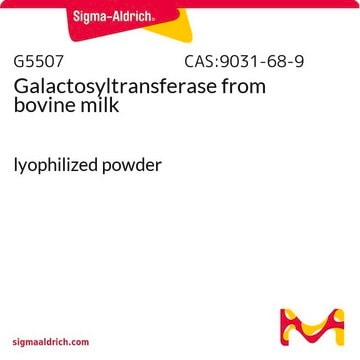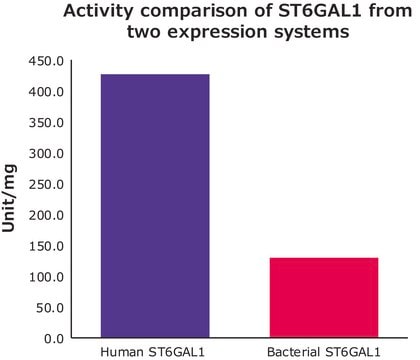SRP0416
T4 Beta-glucosyltransferase
recombinant, expressed in E. coli, ≥83% (SDS-PAGE)
Synonym(s):
T4-phage beta-glucosyltransferase, UDP glucose-DNA ?-glucosyltransferase, hydroxymethyl cytosine
About This Item
Recommended Products
biological source
Escherichia coli
recombinant
expressed in E. coli
Assay
≥83% (SDS-PAGE)
form
aqueous solution
mol wt
41.6 kDa
packaging
pkg of 100 μg
NCBI accession no.
UniProt accession no.
shipped in
dry ice
storage temp.
−70°C
Gene Information
bacteriophage T4 ... B-GT(1258765)
General description
Application
Biochem/physiol Actions
Physical form
Signal Word
Danger
Hazard Statements
Precautionary Statements
Hazard Classifications
Eye Irrit. 2 - Repr. 1B - Skin Irrit. 2
Storage Class Code
6.1C - Combustible acute toxic Cat.3 / toxic compounds or compounds which causing chronic effects
WGK
WGK 1
Flash Point(F)
Not applicable
Flash Point(C)
Not applicable
Certificates of Analysis (COA)
Search for Certificates of Analysis (COA) by entering the products Lot/Batch Number. Lot and Batch Numbers can be found on a product’s label following the words ‘Lot’ or ‘Batch’.
Already Own This Product?
Find documentation for the products that you have recently purchased in the Document Library.
Articles
Explore tools for glycosyltransferase synthesis and modification of glycans, such as glycosyltransferases and nucleotide sugar donors.
Our team of scientists has experience in all areas of research including Life Science, Material Science, Chemical Synthesis, Chromatography, Analytical and many others.
Contact Technical Service










